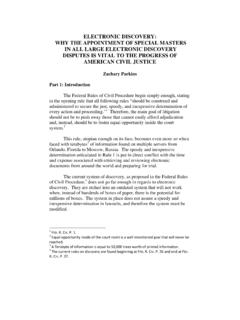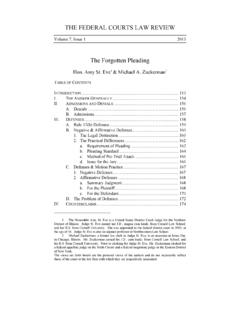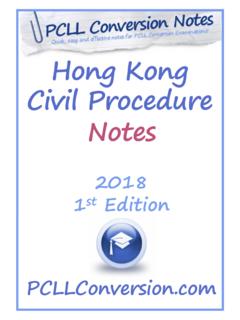Transcription of Judicial Estoppel Article - Gregory, Doyle, Calhoun ...
1 2660-0091 A Primer on Judicial Estoppel By Randall Farmer Attorney Hall, Booth, Smith and Slover, 290 N. Milledge Ave Athens, GA 30601 706-316-0231 Judicial Estoppel . For plaintiff s counsel, those two words could spell the potential termination of your suit. As a defense attorney, Judicial Estoppel could be your best defense in a case. This begs the question: When was the last time you, as a defense attorney, even asserted the defense of Judicial Estoppel ? If you are not inquiring into the applicability of Judicial Estoppel in every case, you could be overlooking a valuable defense to your client. However, evaluating whether Judicial Estoppel applies in your case is a bit like looking into a carnival, fun-house mirror. At times, it is difficult to know exactly what you are looking at or even where it begins or ends. To help elucidate this area of the law, this Article will focus on: 1) what is Judicial Estoppel ; 2) the key elements in any analysis of Judicial Estoppel ; and 3) the difference in the application of Judicial Estoppel between state and federal Overview Before launching into a full analysis of Judicial Estoppel , a brief overview of what type of defense this is may be in order.
2 First, Judicial Estoppel is an affirmative defense. Jones v. Littlejohn, 222 Ga. App. 494, 496-497, 474 714 (1996). As such, it must be raised in either the first responsive pleading or in a motion for summary judgment. If you omit to raise an affirmative defense like Judicial Estoppel in your answer or in your initial brief for summary judgment, you have waived the defense. Rimes Tractor & 1 Although Judicial Estoppel is a federal doctrine, it is applied in Georgia state courts. Nelson & Hill, v. Wood, 245 Ga. App. 60, 537 2d 670 (2000). 2660-0091 Equip. v. Agricredit Acceptance Corp., 216 Ga. App. 249, 454 2d 564 (1995). ( Estoppel is an affirmative defense and must be set forth affirmatively in a responsive pleading or in a motion for summary judgment. Accordingly, [defendant] waived this defense by untimely asserting it in its supplemental brief. ) See also, Brown v. Little, 227 Ga. App. 484, 489 2d 596 (1997).
3 With those practical matters in mind, Judicial Estoppel is based on a federal doctrine that works to preserve the integrity of Judicial proceedings by precluding a party from presenting a legal position which is inconsistent with a position previously and successfully asserted in a prior New Hampshire v. Maine, 532 742, 121 1808 (2001); Chicon v. Carter, 258 Ga. App. 164, 573 SE 2d 413 (2002). In short, Judicial Estoppel is aimed at preventing a party from purposely misleading the bankruptcy court about the non-existence of an actual or potential claim and thereby gaining an unfair advantage from it. In practical terms, the doctrine is commonly applied to preclude a bankruptcy debtor from pursuing a monetary damages claim that was omitted from his assets in the bankruptcy petition. A failure to reveal assets, including unliquidated tort claims3, operates as a denial that such assets exist because it deprives the bankruptcy court of the core information it needs to evaluate and rule upon the bankruptcy petition.
4 It also deprives the creditors of resources that may satisfy unpaid obligations. Thus, the application of Judicial Estoppel preserves the integrity of the Judicial forum. 2 Judicial Estoppel was first recognized as a defense by Georgia courts in 1994. Southmark Corp. v. Trotter, Smith & Jacobs, 212 Ga. App. 454, 455, 442 2d 265 (1994) 3 A plaintiff /debtor is to disclose not only actual claims or assets, but potential claims or assets as well. Southmark Corp. v. Trotter, Smith & Jacobs, 212 Ga. App. 454, 456, 442 2d 265 (1994). 2660-0091 Given that background, it is important for defense counsel to determine whether Judicial Estoppel is even potentially at play in your case early on. It can take several months of discovery to confirm whether or not Judicial Estoppel is applicable in your case. As initial step, upon receipt of the complaint, a search should be done of the bankruptcy records for the plaintiff using LEXIS or a similar online legal resource.
5 In searching the bankruptcy records, it is best to have as much information about the plaintiff as possible, including the plaintiff s social security number. If you do not have time to make such a background check into the plaintiff prior to the filing of the answer, you should assert the defense of Judicial Estoppel in the answer to preserve the If the court records indicate that the plaintiff has filed for bankruptcy, then you need to request the entire bankruptcy file from the appropriate bankruptcy court. This typically entails calling the clerk for that bankruptcy court and inquiring into the costs for an authenticated copy of the debtor s bankruptcy file. It usually takes the bankruptcy court two (2) to four (4) weeks to comply with this request. Once you have the bankruptcy file, you next need to delve into the specific facts of your case. At the outset, you will want to check the schedule of assets that your plaintiff /debtor filed with the bankruptcy petition to see if he/she ever listed the case as an asset on the schedule or amended the petition to list the asset.
6 If the claim is listed, that ends the analysis. Judicial Estoppel does not apply if the plaintiff /debtor disclosed to the bankruptcy court the claim against your client. If the claim is not listed, then you 4 A related defense that counsel should be mindful of is that every action shall be prosecuted in the name of the real party interest. 9-11-17(a). Here, if the claim is part of the bankruptcy estate, then the bankruptcy trustee is real the party in interest, not the plaintiff /debtor. See, Denis v. Delta Airlines, Inc., 248 Ga. App. 377, 546 2d 805 (2001); United Technologies Corp. v. Gaines, 225 Ga. App. 191, 483 2d 357 (1997); Cincinnati Ins. Co. v. Macleod, 259 Ga. App. 761, 577 2d 799 (2003). While beyond the scope of this Article , defense counsel should consider a motion to dismiss based on the real party of interest is the bankruptcy trustee. 2660-0091 next want you to determine what kind of bankruptcy case this is.
7 In other words, is it a Chapter 7, 11 or 13 case? The distinction between the type of bankruptcy cases is most critical in state court cases where the defense of Judicial Estoppel is being contemplated. Did the asset or claim become part of the bankruptcy estate? The significance of the type of bankruptcy to any Judicial Estoppel analysis is most clearly explained by the Georgia Supreme Court in Period Homes, Ltd. v. Wallick, 275 Ga. 486, 487, 569 2d 502 (2002). There, the Georgia Supreme Court explained the standard as: Unlike a bankruptcy proceeding under Chapter 13, there are only limited circumstances in which Chapter 7 or 11 debtors must amend the schedule of assets to reflect property acquired after commencement of the case. 11 USC 541 (a)(7). This is in stark contrast to the amendment requirement that a Chapter 13 debtor is under, which directs that all property acquired after the commencement of the bankruptcy proceeding be included in an amended schedule of assets.
8 11 USC 1306 (a). There is no analogous provision for bankruptcy proceedings under Chapter 7 or 11. Accordingly, a debtor under Chapter 7 or 11 is under no statutory duty to amend its schedule of assets. Period Homes, 275 Ga. at 487. In determining whether an asset or claim became part of the bankruptcy estate5, and therefore has to be disclosed, the Georgia Supreme Court in Period Homes clearly laid out a pre-petition or post-petition dichotomy for the various types of bankruptcies. Hence, the strongest case for the potential application of Judicial Estoppel in state court is typically in the context of a Chapter 13 bankruptcy That s because a Chapter 13 debtor is under an affirmative duty to amend and disclose a potential asset on the schedule of assets in a Chapter 13 Bankruptcy Petition no matter when the asset arose, 5 A debtor s interest in a cause of action, including an unliquidated tort claim, is personal property included as part of the bankrupt estate.
9 Byrd v. JRC Towne Lake, Ltd, 225 Ga. App. 506, 484 2d 309 (1997). 6 Wolfork v. Tackett, 273 Ga. 328 (540 2d 611) (2001) stood for the proposition that any bankruptcy debtor was required to amend their petition to disclose post-petition assets. It is important to note that the holding of Wolfork was limited by Period Homes. The Georgia Supreme Court ruled in Period Homes that only Chapter 13 debtors are under an affirmative duty to amend their assets to disclose claims that arose post-petition. See also, Chicon v. Carter, 258 Ga. App. 164, 573 2d 413 (2002). 2660-0091 either before or after the filing of the bankruptcy petition. Harper v. GMAC Mortgage Corp., 245 Ga. App. 729, 538 2d 816 (2000)7. If the plaintiff /debtor fails to list a claim, or amend a bankruptcy petition to list a claim, then the case for Judicial Estoppel is much stronger. Smalls , 243 Ga. App. 453, 532 2d 420 (2000); Byrd v. JRC Towne Lake, Ltd., 225 Ga. App. 506, 484 2d 309 (1997); Wolfork v.
10 Tackett, 273 Ga. 328, 540 2d 611 (2001); Spoon v. Johnson, 247 Ga. App. 754, 545 2d 328 (2001). However, a Chapter 13 plaintiff /debtor who has not listed a potential claim will doubtlessly attempt to avoid the application of Judicial Estoppel . For such a plaintiff /debtor, two potential arguments exist. First, the plaintiff /debtor may argue that he/she is not under any obligation to disclose a claim or asset because that claim or assent never formed a part of the bankruptcy estate. Chicon v. Carter, 258 Ga. App. at 164. In Chicon, the plaintiff /debtor and another driver were involved in a motor vehicle collision. Prior to the collision, the debtor filed a Chapter 13 bankruptcy petition providing for payment of all their creditors in full. The plaintiff /debtor was discharged and the bankruptcy case was closed. The Georgia Court of Appeals held that the injury and the tort suit occurred after the confirmation of the bankruptcy plan. The plaintiff /debtor gained no unfair advantage by nondisclosure and the bankruptcy court determined that their personal injury claim did not form a part of the bankruptcy estate.



